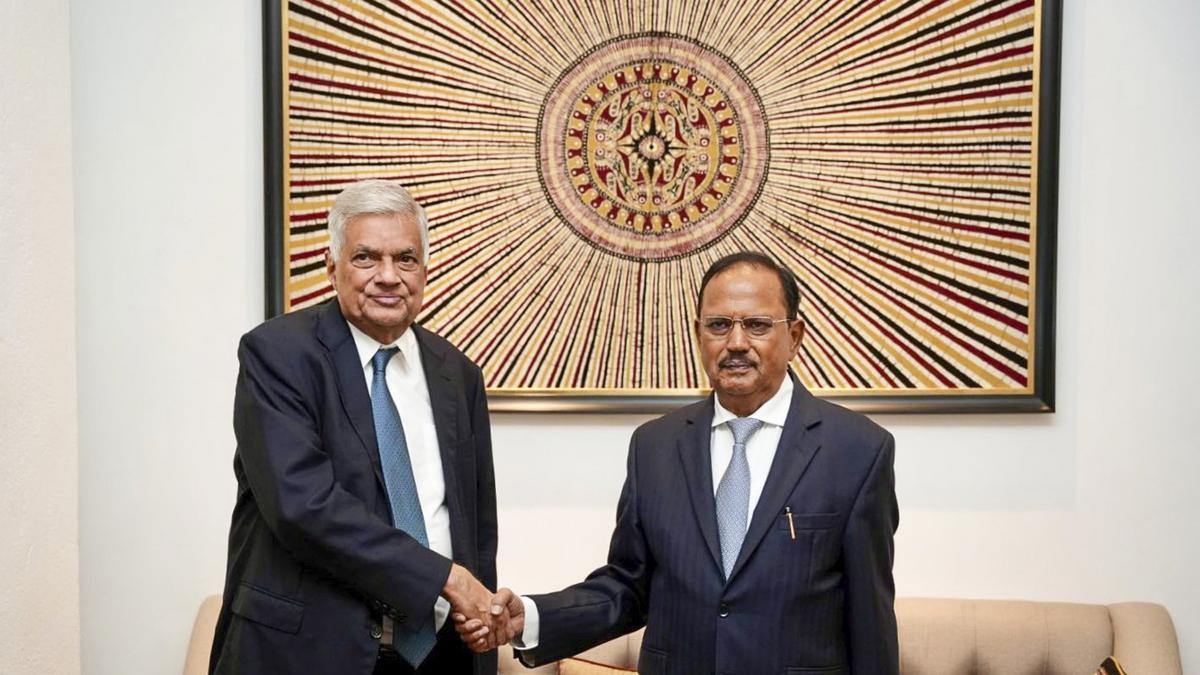India’s National Security Advisor (NSA) Ajit K. Doval’s recent visit to Sri Lanka ahead of its presidential election, served as a pivotal engagement highlighting India’s crucial role in the island nation’s political and economic landscape. His meetings with key political figures, including President Ranil Wickremesinghe, opposition leaders Sajith Premadasa and Anura Kumara Dissanayake, as well as representatives from Tamil and Muslim minorities, underscore India’s diplomatic efforts to shape a favorable environment in Sri Lanka.
Strengthening Bilateral Ties
Doval’s visit focused on bolstering bilateral relations between India and Sri Lanka, especially in the wake of the island nation’s economic crisis. India has played a significant role in providing much-needed financial assistance and crucial infrastructure development projects to aid Sri Lanka’s economic recovery.
India’s Economic Assistance
India’s commitment to Sri Lanka’s economic stability was reiterated through discussions on ongoing collaboration in various sectors. This includes projects in power generation, notably renewable energy and liquefied natural gas (LNG) initiatives, reflecting India’s strategy to reduce Sri Lanka’s dependence on China and enhance its energy security.
India’s Hybrid Energy Projects
The handing over of the first payment for India-backed hybrid energy projects in the Delft, Nainativu, and Analaitivu islands off the Jaffna peninsula further underscores this commitment. The project replaces a similar venture China had agreed to fund, marking India’s continued efforts to counter Chinese influence in Sri Lanka’s strategic location.
Adani Green Energy’s Wind Power Project
Adani Green Energy’s investment of over $440 million for a wind power project in northern Sri Lanka reinforces this trend, signifying India’s proactive role in driving renewable energy solutions and strengthening its presence in Sri Lanka’s power sector. However, this project faces legal challenges due to local concerns about potential environmental impacts.
Addressing the Tamil Issue
Doval’s interactions with leaders representing the island’s Tamil communities were particularly significant. He reportedly emphasized the importance of unity and a coherent position amongst Tamil parties, highlighting the power of numbers in a democracy. This message likely underscores India’s interest in a stable and inclusive political environment in Sri Lanka that addresses the concerns of minority groups, a crucial aspect of long-term stability.
Navigating the Political Landscape
The meetings with President Wickremesinghe and the key opposition figures underscore the complexity of Sri Lankan politics ahead of the crucial presidential election.
Discussions with Presidential Aspirants
Doval’s meetings with President Wickremesinghe and his main challengers, Sajith Premadasa and Anura Kumara Dissanayake, provided an opportunity to engage with prominent contenders and gauge their perspectives on India’s role in Sri Lanka.
India’s Security Interests
While specific details of these discussions have not been made public, it is plausible that India’s bilateral cooperation in economic development and security interests, including countering maritime terrorism and ensuring regional security, were discussed. India’s concerns regarding Chinese influence and the potential for increased Chinese presence in Sri Lanka, including its growing presence in the strategically vital Hambantota port, were likely discussed as well.
Regional Security Framework
Doval’s presence at the signing of the charter and MoU for the establishment of the Colombo Security Conclave (CSC) Secretariat signifies India’s strategic interest in the Indian Ocean Region (IOR). This regional “minilateral” grouping, consisting of Sri Lanka, India, Bangladesh, Maldives, and Mauritius, aims to promote security cooperation in the IOR, countering China’s growing influence in the region.
Countering China’s Influence
The CSC’s formation reflects India’s increasing assertiveness in safeguarding its strategic interests in the IOR and building a regional security architecture that safeguards its maritime interests. The grouping offers a platform for collaborative initiatives, information sharing, and joint exercises to address shared security challenges and collectively counter China’s influence.
Key Take Away Points
Doval’s visit highlights India’s sustained engagement in Sri Lanka’s affairs, strategically positioned as it is within India’s “Neighborhood First” policy and “Security and Growth for All in the Region (SAGAR)” strategy. Key takeaway points include:
- India’s commitment to Sri Lanka’s economic recovery: The provision of financial assistance and infrastructure development projects underscores India’s commitment to supporting Sri Lanka’s economic recovery.
- Promoting a stable and inclusive political environment: Engagement with Tamil leaders highlights India’s concern for the well-being of minority groups in Sri Lanka and encourages inclusivity and a stable political landscape.
- Counteracting Chinese influence: The support for energy projects and the establishment of the CSC reflect India’s strategy to counter China’s growing influence in Sri Lanka and the wider IOR.
- Enhancing regional security: India’s participation in the CSC underlines its dedication to strengthening regional security partnerships and ensuring a stable maritime environment in the IOR.
Doval’s visit has set the stage for sustained engagement between India and Sri Lanka, underscoring the crucial role India plays in Sri Lanka’s stability and prosperity. It also reinforces the complex geopolitical landscape of the Indian Ocean Region and highlights the multifaceted challenges India faces in its strategic rivalry with China.




